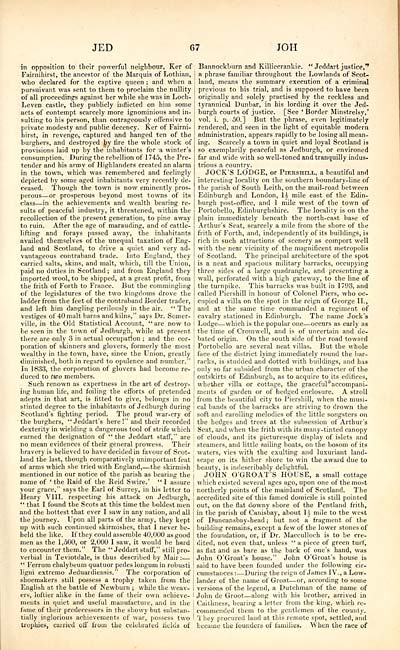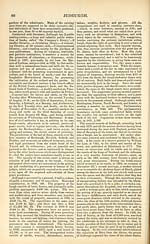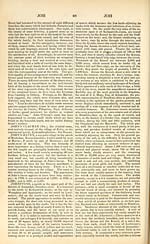Download files
Complete book:
Individual page:
Thumbnail gallery: Grid view | List view

JED
67
JOH
in opposition to their powerful neighbour, Ker of
Fairnihirst, the ancestor of the Marquis of Lothian,
who declared for the captive queen ; and when a
pursuivant was sent to them to proclaim the nullity
of all proceedings against her while she was in Loch-
Leven castle, they publicly inflicted on him some
acts of contempt scarcely more ignominious and in-
sulting to his person, than outrageously offensive to
private modesty and public decency. Ker of Fairni-
hirst, in revenge, captured and hanged ten of the
burghers, and destroyed jt>y fire the whole stock of
provisions laid up by the inhabitants for a winter's
consumption. During the rebellion of 1745, the Pre-
tender and his army of Highlanders created an alarm
in the town, which was remembered and feelingly
depicted by some aged inhabitants very recently de-
ceased. Though the town is now eminently pros-
perous — or prosperous beyond most towns of its
class — in the achievements and wealth bearing re-
sults of peaceful industry, it threatened, within the
recollection of the present generation, to pine away
to ruin. After the age of marauding, and of cattle-
lifting and forays passed away, the inhabitants
availed themselves of the unequal taxation of Eng-
land and Scotland, to drive a quiet and very ad-
vantageous contraband trade. Into England, they
carried salts, skins, and malt, which, till the Union,
paid no duties in Scotland ; and from England they
imported wool, to be shipped, at a great profit, from
the frith of Forth to France. But the commingling
of the legislatures of the two kingdoms drove the
ladder from the feet of the contraband Border trader,
and left him dangling perilously in the air. " The
vestiges of 40 malt barns and kilns," says Dr. Somer-
ville, in the Old Statistical Account, "are now to
be seen in the town of Jedburgh, while at present
there are only 3 in actual occupation ; and the cor-
poration of skinners and glovers, formerly the most
wealthy in the town, have, since the Union, greatly
diminished, both in regard to opulence and number."
In 1833, the corporation of glovers had become re-
duced to two members.
Such renown as expertness in the art of destroy-
ing human life, and foiling the efforts of pretended
adepts in that art, is fitted to give, belongs in no
stinted degree to the inhabitants of Jedburgh during
Scotland's fighting period. The proud war-cry of
the burghers, " Jeddart 's here !" and their recorded
dexterity in wielding a dangerous tool of strife which
earned the designation of "the Jeddart staff," are
no mean evidences of their general prowess. Their
bravery is believed to have decided in favour of Scot-
land the last, though comparatively unimportant feat
of arms which she tried with England, — the skirmish
mentioned in our notice of the parish as bearing the
name of ' the Raid of the Reid Swire.' " I assure
your grace," says the Earl of Surrey, in his letter to
Henry VIII. respecting his attack on Jedburgh,
" that I found the Scots at this time the boldest men
and the hottest that ever I saw in any nation, arid all
the journey. Upon all parts of the army, they kept
up with such continued skirmishes, that I never be-
held the like. If they could assemble 40,000 as good
men as the 1,500, or 2,000 I saw, it would be hard
to encounter them." The " Jeddart staff," still pro-
verbial in Teviotdale, is thus described by Mair :
" Ferrum chalybeum quatuor pedes longum in robusti
ligni extremo Jeduardiensis." The corporation of
shoemakers still possess a trophy taken from the
English at the battle of Newburn ; while the weav-
ers, loftier alike in the fame of their own achieve-
ments in quiet and useful manufacture, and in the
fame of their predecessors in the showy but substan-
tially inglorious achievements of war, possess two
trophies, carried off from the celebrated fields of
Bannockburn and Killiecrankie. "Jeddart justice,"
a phrase familiar throughout the Lowlands of Scot-
land, means the summary execution of a criminal
previous to his trial, and is supposed to have been
originally and solely practised by the reckless and
tyrannical Dunbar, in his lording it over the Jed-
burgh courts of justice. [See ' Border Minstrelsy,'
vol. i. p. 50.] But the phrase, even legitimately
rendered, and seen in the light of equitable modern
administration, appears rapidly to be losing all mean-
ing. Scarcely a town in quiet and loyal Scotland is
so exemplarily peaceful as Jedburgh, or environed
far and wide with so well-toned and tranquilly indus-
trious a country.
JOCK'S LODGE, or Piershiix, a beautiful and
interesting locality on the southern boundary-line of
the parish of South Leith, on the mail-road between
Edinburgh and London, li mile east of the Edin-
burgh post-office, and 1 mile west of the town of
Portobello, Edinburghshire. The locality is on the
plain immediately beneath the north-east base of
Arthur's Seat, scarcely a mile from the shore of the
frith of Forth, and, independently of its buildings, is
rich in such attractions of scenery as comport well
with the near vicinity of the magnificent metropolis
of Scotland. The principal architecture of the spot
is a neat and spacious military barracks, occupying
three sides of a large quadrangle, and presenting a
wall, perforated with a high gateway, to the line of
the turnpike. This barracks was built in 1793, and
called Piershill in honour of Colonel Piers, who oc-
cupied a villa on the spot in the reign of George II.,
and at the same time commanded a regiment of
cavalry stationed in Edinburgh. The name Jock's
Lodge — which is the popular one — occurs as early as
the time of Cromwell, and is of uncertain and de-
bated origin. On the south side of the road toward
Portobello are several neat villas. But the whole
face of the district lying immediately round the bar-
racks, is studded and dotted with buildings, and has
only so far subsided from the urban character of the
outskirts of Edinburgh, as to acquire to its edifices,
whether villa or cottage, the graceful°accompani-
ments of garden or of hedged enclosure. A stroll
from the beautiful city to Piershill, when the musi-
cal bands of the barracks are striving to drown the
soft and carolling melodies of the little songsters on
the hedges and trees at the subsession of Arthur's
Scat, and when the frith with its many-tinted canopv
of clouds, and its picturesque display of islets and
steamers, and little sailing boats, on the bosom of its
waters, vies with the exulting and luxuriant land-
scape on its hither shore to win the award due to
beauty, is indescribably delightful.
JOHN O'GROAT'S HOUSE, a small cottage
which existed several ages ago, upon one of the most
northerly points of the mainland of Scotland. The
accredited site of this famed domicile is still pointed
out, on the flat downy shore of the Pentland frith,
in the parish of Canisbay, about li mile to the west
of Duncansbay-head ; but not a fragment of the
building remains, except a few of the lower stones of
the foundation, or, if Dr. Macculloch is to be cre-
dited, not even that, unless " a piece of green turf,
as flat and as bare as the back of one's hand, was
John O'Groat's house." John O'Groat's house is
said to have been founded under the following cir-
cumstances : — During the reign of James IV., a Low-
lander of the name of Groat — or, according to some
versions of the legend, a Dutchman of the name of
John de Groot — along with his brother, arrived in
Caithness, bearing a letter from the king, which re-
commended them to the gentlemen of the county.
They procured land at this remote spot, settled, and
became the founders of families. When the race of
67
JOH
in opposition to their powerful neighbour, Ker of
Fairnihirst, the ancestor of the Marquis of Lothian,
who declared for the captive queen ; and when a
pursuivant was sent to them to proclaim the nullity
of all proceedings against her while she was in Loch-
Leven castle, they publicly inflicted on him some
acts of contempt scarcely more ignominious and in-
sulting to his person, than outrageously offensive to
private modesty and public decency. Ker of Fairni-
hirst, in revenge, captured and hanged ten of the
burghers, and destroyed jt>y fire the whole stock of
provisions laid up by the inhabitants for a winter's
consumption. During the rebellion of 1745, the Pre-
tender and his army of Highlanders created an alarm
in the town, which was remembered and feelingly
depicted by some aged inhabitants very recently de-
ceased. Though the town is now eminently pros-
perous — or prosperous beyond most towns of its
class — in the achievements and wealth bearing re-
sults of peaceful industry, it threatened, within the
recollection of the present generation, to pine away
to ruin. After the age of marauding, and of cattle-
lifting and forays passed away, the inhabitants
availed themselves of the unequal taxation of Eng-
land and Scotland, to drive a quiet and very ad-
vantageous contraband trade. Into England, they
carried salts, skins, and malt, which, till the Union,
paid no duties in Scotland ; and from England they
imported wool, to be shipped, at a great profit, from
the frith of Forth to France. But the commingling
of the legislatures of the two kingdoms drove the
ladder from the feet of the contraband Border trader,
and left him dangling perilously in the air. " The
vestiges of 40 malt barns and kilns," says Dr. Somer-
ville, in the Old Statistical Account, "are now to
be seen in the town of Jedburgh, while at present
there are only 3 in actual occupation ; and the cor-
poration of skinners and glovers, formerly the most
wealthy in the town, have, since the Union, greatly
diminished, both in regard to opulence and number."
In 1833, the corporation of glovers had become re-
duced to two members.
Such renown as expertness in the art of destroy-
ing human life, and foiling the efforts of pretended
adepts in that art, is fitted to give, belongs in no
stinted degree to the inhabitants of Jedburgh during
Scotland's fighting period. The proud war-cry of
the burghers, " Jeddart 's here !" and their recorded
dexterity in wielding a dangerous tool of strife which
earned the designation of "the Jeddart staff," are
no mean evidences of their general prowess. Their
bravery is believed to have decided in favour of Scot-
land the last, though comparatively unimportant feat
of arms which she tried with England, — the skirmish
mentioned in our notice of the parish as bearing the
name of ' the Raid of the Reid Swire.' " I assure
your grace," says the Earl of Surrey, in his letter to
Henry VIII. respecting his attack on Jedburgh,
" that I found the Scots at this time the boldest men
and the hottest that ever I saw in any nation, arid all
the journey. Upon all parts of the army, they kept
up with such continued skirmishes, that I never be-
held the like. If they could assemble 40,000 as good
men as the 1,500, or 2,000 I saw, it would be hard
to encounter them." The " Jeddart staff," still pro-
verbial in Teviotdale, is thus described by Mair :
" Ferrum chalybeum quatuor pedes longum in robusti
ligni extremo Jeduardiensis." The corporation of
shoemakers still possess a trophy taken from the
English at the battle of Newburn ; while the weav-
ers, loftier alike in the fame of their own achieve-
ments in quiet and useful manufacture, and in the
fame of their predecessors in the showy but substan-
tially inglorious achievements of war, possess two
trophies, carried off from the celebrated fields of
Bannockburn and Killiecrankie. "Jeddart justice,"
a phrase familiar throughout the Lowlands of Scot-
land, means the summary execution of a criminal
previous to his trial, and is supposed to have been
originally and solely practised by the reckless and
tyrannical Dunbar, in his lording it over the Jed-
burgh courts of justice. [See ' Border Minstrelsy,'
vol. i. p. 50.] But the phrase, even legitimately
rendered, and seen in the light of equitable modern
administration, appears rapidly to be losing all mean-
ing. Scarcely a town in quiet and loyal Scotland is
so exemplarily peaceful as Jedburgh, or environed
far and wide with so well-toned and tranquilly indus-
trious a country.
JOCK'S LODGE, or Piershiix, a beautiful and
interesting locality on the southern boundary-line of
the parish of South Leith, on the mail-road between
Edinburgh and London, li mile east of the Edin-
burgh post-office, and 1 mile west of the town of
Portobello, Edinburghshire. The locality is on the
plain immediately beneath the north-east base of
Arthur's Seat, scarcely a mile from the shore of the
frith of Forth, and, independently of its buildings, is
rich in such attractions of scenery as comport well
with the near vicinity of the magnificent metropolis
of Scotland. The principal architecture of the spot
is a neat and spacious military barracks, occupying
three sides of a large quadrangle, and presenting a
wall, perforated with a high gateway, to the line of
the turnpike. This barracks was built in 1793, and
called Piershill in honour of Colonel Piers, who oc-
cupied a villa on the spot in the reign of George II.,
and at the same time commanded a regiment of
cavalry stationed in Edinburgh. The name Jock's
Lodge — which is the popular one — occurs as early as
the time of Cromwell, and is of uncertain and de-
bated origin. On the south side of the road toward
Portobello are several neat villas. But the whole
face of the district lying immediately round the bar-
racks, is studded and dotted with buildings, and has
only so far subsided from the urban character of the
outskirts of Edinburgh, as to acquire to its edifices,
whether villa or cottage, the graceful°accompani-
ments of garden or of hedged enclosure. A stroll
from the beautiful city to Piershill, when the musi-
cal bands of the barracks are striving to drown the
soft and carolling melodies of the little songsters on
the hedges and trees at the subsession of Arthur's
Scat, and when the frith with its many-tinted canopv
of clouds, and its picturesque display of islets and
steamers, and little sailing boats, on the bosom of its
waters, vies with the exulting and luxuriant land-
scape on its hither shore to win the award due to
beauty, is indescribably delightful.
JOHN O'GROAT'S HOUSE, a small cottage
which existed several ages ago, upon one of the most
northerly points of the mainland of Scotland. The
accredited site of this famed domicile is still pointed
out, on the flat downy shore of the Pentland frith,
in the parish of Canisbay, about li mile to the west
of Duncansbay-head ; but not a fragment of the
building remains, except a few of the lower stones of
the foundation, or, if Dr. Macculloch is to be cre-
dited, not even that, unless " a piece of green turf,
as flat and as bare as the back of one's hand, was
John O'Groat's house." John O'Groat's house is
said to have been founded under the following cir-
cumstances : — During the reign of James IV., a Low-
lander of the name of Groat — or, according to some
versions of the legend, a Dutchman of the name of
John de Groot — along with his brother, arrived in
Caithness, bearing a letter from the king, which re-
commended them to the gentlemen of the county.
They procured land at this remote spot, settled, and
became the founders of families. When the race of
Set display mode to: Large image | Transcription
Images and transcriptions on this page, including medium image downloads, may be used under the Creative Commons Attribution 4.0 International Licence unless otherwise stated. ![]()
| Gazetteers of Scotland, 1803-1901 > Topographical, statistical, and historical gazetteer of Scotland > Volume 2 > (77) Page 67 |
|---|
| Permanent URL | https://digital.nls.uk/97449514 |
|---|
| Description | Volume second: I-Z. |
|---|---|
| Shelfmark | Map Room Ref.2 |
| Attribution and copyright: |
|

